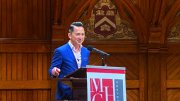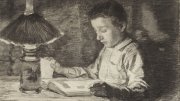When Viet Thanh Nguyen, RF ’09, was 11, he spent his weekends in San Jose on his family’s red velour couch watching war movies. One day, he turned on Apocalypse Now—perhaps an odd choice for a child who fled Vietnam as a four-year-old during the war. Midway through the film, an American navy patrol boat pulls up to a sampan full of Vietnamese civilians. When one of them, a woman, makes a sudden movement, the Americans open fire. She survives the initial assault, but is killed when the captain shoots her in the chest. “I was split in two,” said Nguyen during his first Norton Lecture at Harvard last week. “Was I the American doing the killing, or the Vietnamese being killed?”
The movie introduced Nguyen to the concept of duality: he was both American and Vietnamese, citizen and refugee, colonizer and colonized. But it also prompted him to think about the narrative treatment of outsiders. In films like Apocalypse Now, white American men are complexly portrayed as both saviors and villains—heroes and anti-heroes—whereas Vietnamese people are rendered either as helpless refugees or sadistic murderers. He wondered why minorities should be deprived of the full, nuanced range of human experiences.
Now, as a writer, Nguyen explores how duality is an inherent aspect of the minority experience. Through drama and humor, he seeks to paint a robust portrait of minority life. Nguyen’s characters are complex figures split between nationalities, loyalties, and philosophies. Sometimes, they’re fictional, like the Vietnamese double agent in his Pulitzer Prize-winning debut novel, The Sympathizer (2015). Other times, it’s himself, as in his forthcoming National Book Award long-listed memoir, A Man of Two Faces: a memoir, a history, a memorial (2023).
Last Tuesday, Nguyen began his lecture series with a talk titled “On the Double, or Inauthenticity.” Founded in 1925, the Charles Eliot Norton Professorship in Poetry now biennially invites prominent artists, writers, and musicians to deliver a six-part lecture series about their craft. Nguyen, an English professor at the University of Southern California, named his series “To Save and To Destroy: On Writing as an Other.” Before an attentive Sanders Theatre audience, he encouraged minority writers (broadly defined) to avoid common tropes and oversimplifications.
Throughout his lecture, Nguyen used the term “other” to describe minorities, maintaining that “minority” simply means less than half, but “otherness” is based on societal position. Referencing Toni Morrison’s [Litt.D. ’89] Norton Lectures, he said otherness emerges from the fears projected onto “those we label strangers, foreigners, enemies, invaders, threats.” Otherness is not inherent to any group, he asserted; it is imposed by the dominant culture.
Nguyen believes that minority writers too often seek to tell “sob stories” about their identities. Sometimes, this tendency is due to a perceived obligation to their ethnic, religious, or racial group. “This burden of representation,” he said, “demands that writers tell idealized, sanitized, or stereotyped stories about their communities…as they attempt to carry out salvation through stories.”
But Nguyen said stories of victimhood limit the abilities of minority writers, and paint a shallow portrait of their subjects. First, artists pander to “a mercy that may or may not come,” he said, “a mercy which depends on the guns, cameras, and pens of…the masters.” Second, they deprive minorities of the chance to share their complete life experiences. The dominant audience, Nguyen said, expects minority artists to share “one, and only one specific trauma—the trauma which belongs to this other and to which this other is bound.” Nguyen mentioned Bao Phi, a poet who wrote about a family that fled both the Vietnam War and Hurricane Katrina. Some readers scoffed at this double tragedy. “It’s like, this country only allows us one grief at a time,” Nguyen said. “Your people, you have that war thing! That’s all you get!”
Most critically, when minority artists only tell sob stories, they deny themselves what Nguyen called “the full power of art.” In Apocalypse Now (and countless other works), he noted that white men could depict “white men committing atrocities and get me and millions of others to read and watch them do so repeatedly.” Those characters had backstories, were not strictly portrayed as villains, and induced critique rather than simple antagonism. He insisted Vietnamese people should be showcased in the fullness of their complexity, too. Instead of mere bewilderment, Nguyen asked, shouldn’t audiences see Vietnamese peoples’ “rage, sadness, melancholy, bitterness, resentment, affection, and love?” And to challenge the others’ innocence, he submitted that audiences should learn about “the domestic abuse, gang violence, adultery, alcoholism, thievery, or the economic predation some of us did to each other or the government.”
In telling their own stories Nguyen suggested that minority artists return to the concept of duality. “The aesthetic and political response of others must be to claim both sides of the double,” he says, “As well as everything in between, which is what the masters have always done, and to great effect.”









